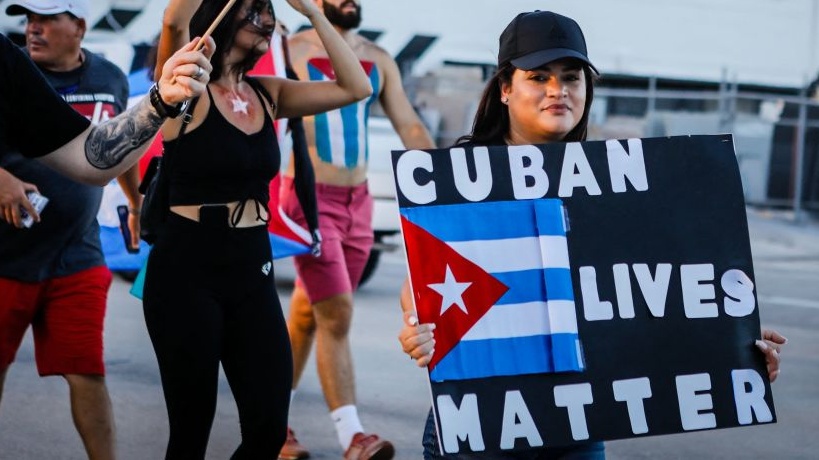After being at the forefront of advocacy for victims of civil and social unjust in the U.S., Black Lives Matter (BLM) is now throwing its support behind another matter— Cuba's government.
Cubans, including Afro Latinas, have been protesting the country's government and dire economic shortages, NBC News reported. Residents have taken to the streets to demand freedom while proclaiming "down with the dictatorship."
People in the country have cited food shortages, lack of medicinal resources amid the pandemic, power outages, inflation and limited access to necessities, according to NBC News. But Cuban President Miguel Díaz-Canel is blaming the U.S. embargo restrictions put in place during the Trump Administration. Former President Barack Obama, during his first term, lifted a decades-old embargo restriction, making way for tourism and economic trade.
Amid the unjust, BLM Global Network says it stands in "solidarity with oppressed peoples of African descent." Here's how the organization is supporting Cubans:
BLM issued a powerful statement in support of protesters.
In a statement posted to Instagram, BLM urged the U.S. government to stop the enforcement of its embargoes on the country, saying the economic restrictions are to blame for Cuba's instability over the years.
“The United States has forced pain and suffering on the people of Cuba by cutting off food, medicine and supplies,” the post read. “The people of Cuba are being punished by the U.S. government because the country has maintained its commitment to sovereignty and self-determination.”
The statement further read “Cuba has historically demonstrated solidarity with oppressed peoples of African descent,” and seemingly praised the island's efforts of "racial justice." Additionally, the statement referenced its protection of Assata Shakur, a former Black Panther on the FBI's most-wanted list, Daily Mail reported.
Critics said BLM's statement incorrectly depicts the reason for the unrest in Cuba.
Several people flooded the comments to show their outrage over the statement. Many pointed out that the U.S. government's embargo, albeit a separate issue on its own, is not the primary reason behind the recent protests.
Critics say that BLM’s recent Instagram post, which blames the U.S. government for Cuba’s current political crisis, is in large part spreading wide misinformation, the New York Post reported. They say BLM has actively ignored the calls for freedom from Cuba’s oppressed citizens.
“This is a horrible misrepresentation of what’s happening in Cuba and I'm incredibly disappointed,” one person wrote.
“Noooooo you’re spreading miss information about Cuba. This has nothing to do with the U.S. embargo. Has everything to do with a dictatorship that has been going on for 62 years,” another user commented.
BLM leaders say they are dedicated to amplifying the voices of Afro Cubans.
BLM leaders responded to the backlash, saying their statement was "grounded in our unequivocal support for Cuba."
They added that the organization promises to amplify the voice of Afro Cubans protesting oppression "from all actors, including the United States Embargo."
“We unequivocally join in solidarity with the Cuban people against repression and violence from internal and unseen external actors,” officials said in response. “We also understand that Anti-Blackness exists within Cuba and is a Global issue. We struggle for and alongside Black people across the diaspora for liberation and self-sovereignty.”
Cuba has a history of stifling calls for justice over police brutality against Black people.
While BLM vows to advocate for Afro Cubans, the country has battled with police brutality against Black and brown people, too.
In June 2020, just weeks after the killing of George Floyd on U.S. soil, 27-year-old Hansel Hernandez was shot and killed by police in Cuba, Reuters reported. Hernandez was accused of vandalizing and was chased down by the police.
Protesters said local authorities staked out their homes, preventing them from demonstrating against the police killing of Hernandez. Additionally, protesters said state telecoms monopoly ETECSA cut off their mobile service.
According to Reuters, protests against the country are rare due to Communist authorities and are tightly controlled by law enforcement. However, critics said the government have been lackadaisical in condemning police brutality.
Now, the protests which started on Sunday in San Antonio de los Baños, have spread to 40 additional cities including Havana as President Díaz-Canel has shut down communication as well as internet services across the island.
According to BBC News, the protests have become the biggest anti-government demonstrations the island has seen in 30 years.

